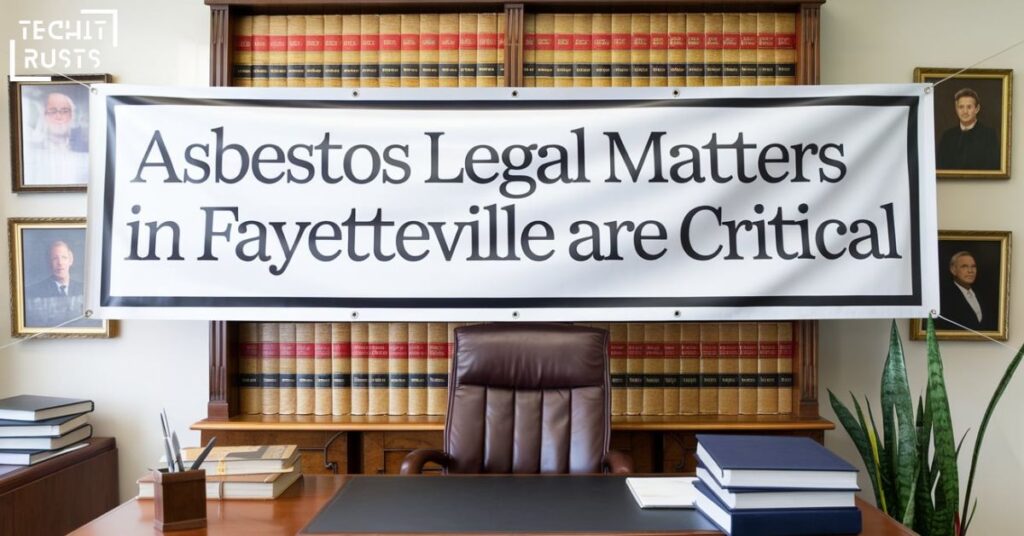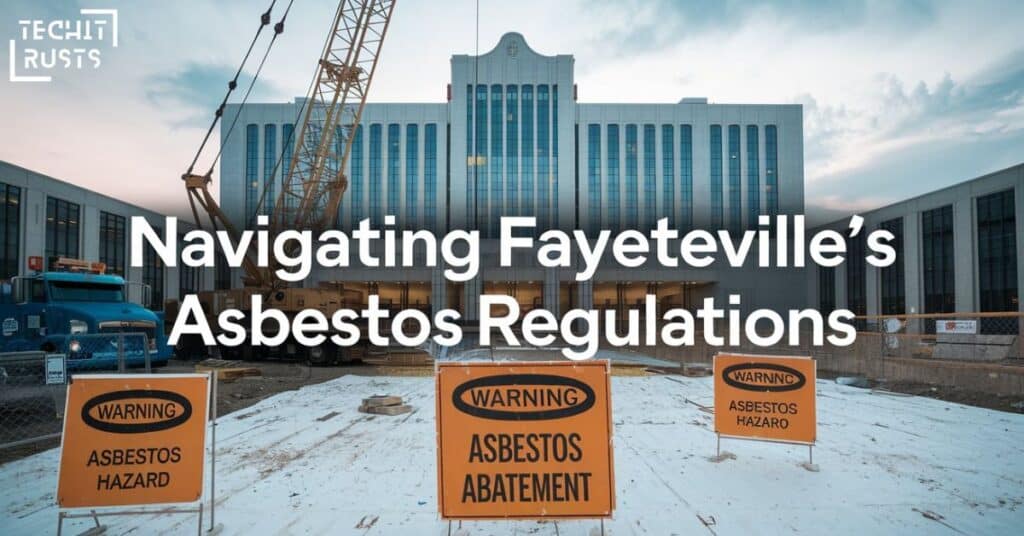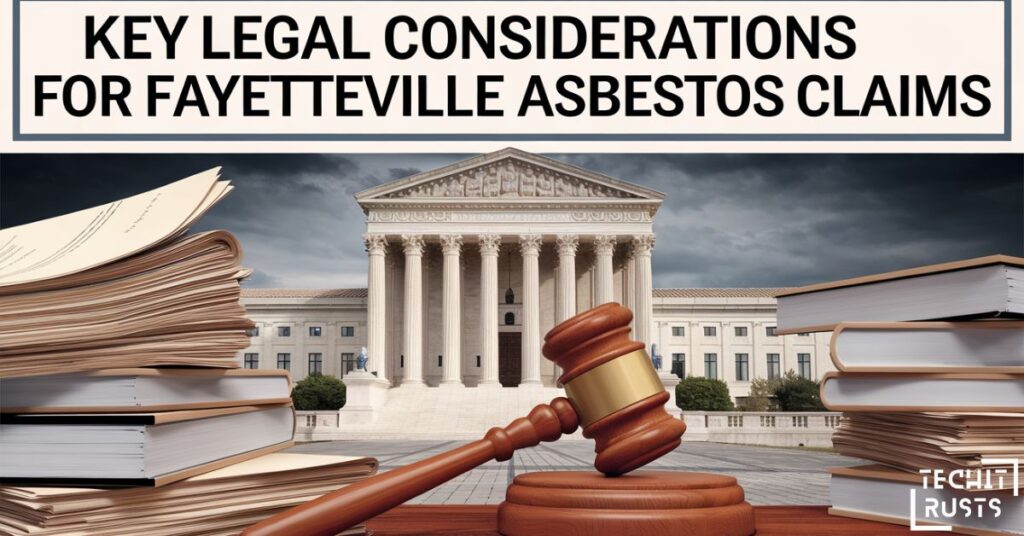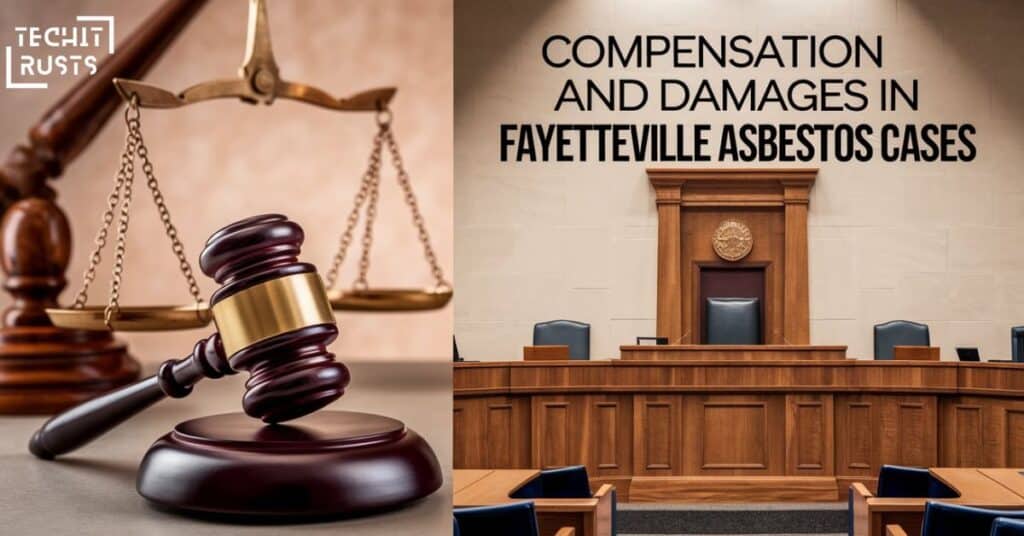When dealing with Fayetteville Asbestos Legal Questions and asbestos-related legal matters in Fayetteville, North Carolina, it’s crucial to understand the many complexities that surround asbestos exposure lawsuits and regulations. Asbestos has been linked to severe health conditions, such as mesothelioma and lung cancer, affecting thousands of people across the United States.
If you’ve been exposed to asbestos or suspect that you may have been, knowing your legal rights, the filing process, and how to seek compensation is vital. This guide will provide you with a detailed, step-by-step understanding of Fayetteville’s asbestos regulations, asbestos-related health risks, and the legal actions you can take to protect yourself or your loved ones.
Whether you’re looking to file an asbestos exposure lawsuit or just want to learn about the asbestos regulations in Fayetteville, this article covers everything you need to know.
Introduction: Why Asbestos Legal Matters in Fayetteville Are Critical
Asbestos exposure remains a health risk in Fayetteville, North Carolina, as older homes, industrial buildings, and schools built before the 1980s likely contain asbestos-containing materials (ACMs). Fayetteville Asbestos Legal Questions often arise not only in litigation but also in public safety concerns about how asbestos is handled and removed.

Many Fayetteville residents, especially those who worked in industries where asbestos was used, face increased risks. If you’re filing a claim for yourself or a loved one, understanding Fayetteville Asbestos Legal Questions and North Carolina asbestos claims is crucial for navigating the legal system effectively.
What Is Asbestos, and Why Is It Dangerous?
Asbestos is a group of naturally occurring minerals made up of tiny fibers. It was once widely used in construction materials because it is strong and heat-resistant. However, when asbestos materials are disturbed, they release fibers into the air. These fibers can be inhaled, leading to serious health issues.
Over time, exposure to asbestos can cause diseases like lung cancer and mesothelioma. This makes handling asbestos very dangerous. The danger of asbestos lies in its long-term effects. Many health problems linked to asbestos take years to develop. Symptoms may not appear until decades after exposure.
This delay makes it hard for people to connect their illness to past asbestos exposure. For this reason, it’s crucial to manage asbestos safely. If you suspect asbestos is present, consult professionals for proper handling and removal.
Key Characteristics of Asbestos:
- Heat Resistance: Asbestos is extremely resistant to heat, which is why it was commonly used in insulation materials, brake linings, and fireproof products.
- Durability: Its fibers are strong and flexible, making it a desirable choice for building materials.
- Widespread Use: Industries such as construction, shipbuilding, and manufacturing were major users of asbestos-containing products, many of which were installed in Fayetteville buildings and facilities.
Why Asbestos Becomes a Health Hazard
Asbestos fibers are microscopic, but they become deadly when inhaled. These fibers can remain lodged in the lungs and other organs for years, often leading to chronic health conditions that don’t manifest for decades. This long latency period is why asbestos-related diseases are often diagnosed years after exposure, which complicates both medical treatment and legal claims.
Once inhaled or ingested, asbestos fibers can cause inflammation and scarring, leading to severe diseases such as mesothelioma, asbestosis, and lung cancer.
Health Risks Associated with Asbestos Exposure
Understanding the specific health risks tied to asbestos exposure is crucial for determining your eligibility for legal action. Below are the most common asbestos-related diseases and their associated health risks:
- Mesothelioma: This is a rare and aggressive cancer that affects the lining of the lungs (pleura), abdomen (peritoneum), or heart (pericardium). The primary cause of mesothelioma is asbestos exposure, and symptoms include shortness of breath, chest pain, and weight loss. Mesothelioma has a long latency period, often taking 20 to 50 years to develop after exposure. It’s also notoriously difficult to treat, making early detection and legal action essential.
- Asbestosis: A chronic lung disease that results from long-term exposure to asbestos. It causes scarring of lung tissue, leading to symptoms such as coughing, shortness of breath, and fatigue. Asbestosis is a progressive disease that can worsen over time and may increase the risk of developing lung cancer.
- Lung Cancer: Asbestos exposure is a known cause of lung cancer, especially among smokers. Symptoms may include persistent coughing, chest pain, and difficulty breathing.
- Pleural Thickening: This condition involves the thickening and stiffening of the lung’s lining, which can restrict lung function and cause breathing difficulties.
Asbestos-related diseases can be devastating, and victims may face mounting medical bills, loss of income, and a diminished quality of life. If you or a loved one has been diagnosed with one of these conditions due to asbestos exposure in Fayetteville, it’s crucial to act quickly to secure the compensation you’re entitled to.
Case Study: The Impact of Asbestos Exposure in North Carolina
In a recent mesothelioma lawsuit North Carolina, a former construction worker in Fayetteville was awarded significant compensation after being diagnosed with mesothelioma. He had spent years working on various building projects throughout the city, many of which used asbestos-containing materials. His legal team successfully proved that the contractors and manufacturers of the materials failed to provide adequate warnings about the dangers of asbestos, which contributed to his illness.
This case highlights the importance of understanding the asbestos legal rights of Fayetteville residents, as well as the legal responsibilities of employers and manufacturers.
Navigating Fayetteville’s Asbestos Regulations
Navigating Fayetteville’s asbestos regulations is essential for ensuring safety and compliance. Asbestos regulations are governed by federal, state, and local laws designed to protect public health.

At the federal level, the Environmental Protection Agency (EPA) and the Occupational Safety and Health Administration (OSHA) set guidelines for asbestos management, focusing on safe removal and disposal practices. In North Carolina, state regulations complement federal guidelines and require that licensed professionals handle asbestos removal.
Fayetteville may also have specific local regulations that property owners and contractors must follow. Understanding these regulations helps prevent exposure and legal issues. Always consult with qualified professionals to ensure compliance and safety when dealing with asbestos.
Federal Asbestos Regulations
At the national level, asbestos regulation is primarily managed by the Environmental Protection Agency (EPA) and the Occupational Safety and Health Administration (OSHA). These agencies oversee workplace safety and environmental laws that aim to limit public exposure to asbestos.
- Clean Air Act (CAA): The CAA regulates air pollutants, including asbestos, to ensure that asbestos fibers are not released into the environment during demolition or renovation projects. Under this law, the EPA has established the National Emission Standards for Hazardous Air Pollutants (NESHAP), which specifically addresses the handling and disposal of asbestos materials.
- Occupational Safety and Health Administration (OSHA): OSHA enforces regulations to protect workers from asbestos exposure. It sets permissible exposure limits (PELs) and mandates that employers provide proper protective equipment and training to employees who may be exposed to asbestos on the job.
- Asbestos Hazard Emergency Response Act (AHERA): AHERA is a federal law that requires schools to inspect for asbestos-containing materials and to create management plans for the safe handling of asbestos in school buildings. This is particularly important for Fayetteville schools built before the 1980s.
North Carolina Asbestos Regulations
North Carolina asbestos claims are governed by state-specific regulations that complement federal laws. The North Carolina Department of Environmental Quality (NCDEQ) plays a significant role in regulating asbestos removal, disposal, and abatement in the state. These state regulations ensure that asbestos is safely removed from public and private buildings, minimizing the risk of exposure.
Key North Carolina asbestos regulations include:
- Asbestos Management Program: This program mandates proper asbestos removal procedures and certifications for contractors involved in asbestos abatement.
- North Carolina Asbestos Hazard Management Act: This act imposes strict rules on asbestos removal in schools, public buildings, and other facilities across the state. It requires licensed asbestos contractors to follow specific protocols for safely removing and disposing of asbestos-containing materials.
Fayetteville-Specific Asbestos Regulations
At the local level, asbestos regulations in Fayetteville ensure compliance with both state and federal laws. The Fayetteville-Cumberland County Planning and Inspections Department oversees building permits and inspections related to asbestos removal. Property owners, contractors, and businesses are required to follow local guidelines when dealing with asbestos-containing materials.
For example, before any renovation or demolition project in Fayetteville, an asbestos inspection must be conducted to assess the presence of asbestos. If asbestos is found, licensed abatement professionals must remove it following stringent safety procedures.
The combined framework of federal, state, and local regulations is designed to protect Fayetteville residents from the dangers of asbestos exposure. However, these regulations also form the foundation for pursuing legal action in cases where asbestos exposure has caused serious health issues.
Key Legal Considerations for Fayetteville Asbestos Claims
Key legal considerations for Fayetteville asbestos claims are crucial for anyone affected by asbestos exposure. First, it’s important to understand the statute of limitations, which is typically three years from the date of diagnosis or when the disease should have been discovered. Missing this deadline can result in losing the right to file a claim, so timely action is essential.

Additionally, establishing proof of asbestos exposure is vital for your claim. This may involve gathering medical records, employment history, and witness statements to demonstrate that your illness is linked to asbestos. Consulting with an experienced asbestos attorney can help you navigate these legal complexities and build a strong case for compensation. Understanding these factors can significantly impact the outcome of your claim.
Filing an Asbestos Exposure Lawsuit in Fayetteville
Filing an asbestos exposure lawsuit in Fayetteville involves several critical steps to ensure your case is strong and compliant with legal requirements. First, it’s essential to obtain a formal diagnosis of an asbestos-related illness from a qualified medical professional.
This diagnosis will serve as the foundation of your claim and must be documented. Next, gather evidence that links your exposure to asbestos. This can include employment records, medical documents, and witness statements confirming your presence in environments where asbestos was present.
Once you have the necessary documentation, consult with an experienced asbestos attorney who can guide you through the legal process. They will help you file your claim in the appropriate court, ensuring that all paperwork is completed accurately and submitted within the statute of limitations. Taking these steps can increase your chances of receiving the compensation you deserve.
Eligibility Criteria for Filing Asbestos Claims
Before filing a claim, you must meet specific eligibility requirements, including:
- Diagnosis of an Asbestos-Related Disease: You must have a medical diagnosis confirming that you have an asbestos-related illness, such as mesothelioma, asbestosis, or lung cancer.
- Proof of Exposure: You must provide evidence that you were exposed to asbestos in Fayetteville, either through your work, home, or another location. This may include employment records, witness statements, or documentation of asbestos-containing materials in your environment.
- Link Between Exposure and Illness: There must be a clear link between your asbestos exposure and your medical condition. This often requires expert testimony from medical professionals.
Statute of Limitations for Asbestos Claims in North Carolina
The statute of limitations for asbestos claims in North Carolina is three years from the date of diagnosis. This means you must file your lawsuit within three years of receiving your diagnosis or risk losing your right to seek compensation. In cases of wrongful death, the statute of limitations is two years from the date of death.
Given the complexity of asbestos-related illnesses and the time it can take for symptoms to appear, it’s critical to consult with a Fayetteville asbestos lawyer as soon as you suspect asbestos exposure.
Steps in the Asbestos Claims Process
Once you’ve established eligibility, the next step is to file your asbestos exposure lawsuit. The process involves several key steps:
- Initial Consultation: Meet with a Fayetteville asbestos lawyer to discuss your case and determine your eligibility. The lawyer will gather the necessary documentation, including your medical records and proof of exposure.
- Filing the Lawsuit: Your attorney will file the lawsuit on your behalf, naming the parties responsible for your asbestos exposure. This could include manufacturers of asbestos-containing products, employers, property owners, or contractors.
- Discovery Phase: During discovery, both sides will exchange evidence, including medical records, employment history, and expert testimony. This phase is critical in building a strong case.
- Negotiation and Settlement: In many asbestos cases, the parties may agree to a settlement before going to trial. Settlements can provide faster compensation and avoid the uncertainty of a court trial.
- Trial: If a settlement cannot be reached, the case will go to trial, where a judge or jury will determine liability and compensation.
Types of Evidence Required for Asbestos Lawsuits
In order to prove your case, you’ll need to provide compelling evidence of asbestos exposure and the resulting health effects. The most common types of evidence include:
- Medical Records: These documents should show a diagnosis of an asbestos-related disease, such as mesothelioma or lung cancer.
- Employment History: Proof that you worked in an industry or location where asbestos exposure was likely.
- Witness Statements: Testimony from coworkers or others who can confirm your asbestos exposure.
- Product Identification: Evidence linking specific asbestos-containing products to your exposure. This may include company records, product manuals, or safety reports.
Compensation and Damages in Fayetteville Asbestos Cases
Compensation and damages in Fayetteville asbestos cases can help victims manage the financial burdens caused by asbestos-related illnesses. Individuals may seek compensation for various expenses, including medical bills, lost wages, and ongoing care. This financial support is crucial for covering treatments like surgeries, chemotherapy, and rehabilitation.

Additionally, victims can claim damages for pain and suffering, which address the emotional and physical toll of their conditions. If a loved one has passed away due to an asbestos-related disease, families may also pursue wrongful death benefits to cover funeral costs and provide support for dependents.
The amount of compensation can vary based on factors like the severity of the illness and the extent of exposure, making it essential to work with an experienced attorney to maximize your claim.
Types of Compensation Available
- Medical Expenses: Compensation for past and future medical bills related to the treatment of your asbestos-related illness.
- Lost Wages: If your illness has caused you to miss work or has diminished your earning capacity, you can seek compensation for lost income.
- Pain and Suffering: Non-economic damages for the physical and emotional pain caused by your illness.
- Wrongful Death: If a loved one has passed away due to an asbestos-related illness, surviving family members can seek compensation for funeral expenses, loss of companionship, and other damages.
Factors Influencing Compensation
Several factors can influence the amount of compensation awarded in an asbestos exposure lawsuit, including:
- The severity of your illness and prognosis.
- The extent of your asbestos exposure and the evidence supporting your claim.
- Whether you can identify the companies or individuals responsible for your exposure.
How to Choose the Right Asbestos Attorney in Fayetteville
Choosing the right asbestos attorney in Fayetteville is crucial for a successful claim. Start by looking for attorneys who specialize in asbestos litigation. Their experience in handling similar cases can make a significant difference in the outcome. Check online legal directories or local bar associations to find qualified attorneys in your area.
Next, read client reviews and testimonials to gauge the attorney’s reputation and success rate. It’s also important to schedule consultations with potential lawyers. Use this time to ask questions about their experience, approach, and fees.
A good attorney should be attentive, communicative, and willing to explain the legal process clearly. Taking the time to find the right attorney can help ensure that your case is handled effectively and that you receive the compensation you deserve.
Why Hiring a Specialized Asbestos Attorney Matters
A Fayetteville asbestos lawyer understands the local regulations and the specific challenges faced by victims in North Carolina. They have the expertise to gather the necessary evidence, file claims within the statute of limitations, and negotiate for the best possible outcome.
Tips for Finding a Reputable Asbestos Lawyer
- Experience with Asbestos Cases: Look for an attorney with a proven track record of handling North Carolina asbestos claims.
- Local Knowledge: Attorneys familiar with asbestos regulations in Fayetteville can navigate the local legal landscape more effectively.
- Client Testimonials and Reviews: Read reviews from past clients to get a sense of an attorney’s success rate and approach to cases.
Fayetteville Resources for Asbestos Victims
Fayetteville offers various resources for asbestos victims seeking support and assistance. Local law firms specializing in asbestos litigation can provide expert legal guidance for navigating claims and securing compensation.

These firms understand the complexities of asbestos cases and can help victims gather necessary evidence and build a strong case. In addition to legal resources, health organizations in Fayetteville offer support for those affected by asbestos-related illnesses.
The Asbestos Disease Awareness Organization (ADAO) provides educational materials and connects individuals with support groups. Local hospitals and health clinics may also have advocacy programs and resources to help patients manage their conditions. Utilizing these resources can provide victims with the assistance they need during this challenging time.
Legal Resources
- North Carolina Department of Labor (NCDOL): Offers resources on workplace safety and asbestos exposure.
- Fayetteville Law Firms Specializing in Asbestos Litigation: Numerous local firms provide expert legal guidance on filing asbestos claims in Fayetteville.
Health Resources
- Cape Fear Valley Health: Provides treatment for asbestos-related diseases in Fayetteville.
- North Carolina Cancer Hospital: A leading facility for cancer treatment, including mesothelioma.
What Is Asbestos and Why Is It Dangerous?
Asbestos is a group of naturally occurring minerals known for their heat resistance and durability. When disturbed, asbestos fibers can become airborne and be inhaled or ingested. This exposure can lead to severe health risks, including asbestosis, lung cancer, and mesothelioma, which often take decades to manifest.
How Can I Tell If I Have Been Exposed to Asbestos?
You may have been exposed to asbestos if you worked in industries such as construction, shipbuilding, or manufacturing, especially before the 1980s. Symptoms of asbestos-related diseases often take years to develop, so it’s crucial to consult a healthcare professional if you have concerns about past exposure.
Can I File a Lawsuit for Asbestos Exposure?
Yes, if you have been diagnosed with an asbestos-related disease due to exposure, you may file a lawsuit to seek compensation. It is advisable to consult with an experienced Fayetteville asbestos lawyer to discuss your legal options and the specifics of your case.
What Are My Legal Rights If I Have Been Exposed to Asbestos?
As an asbestos exposure victim, you have the right to pursue compensation for medical expenses, lost wages, and pain and suffering. Additionally, you can seek legal recourse against manufacturers, employers, or other parties responsible for your exposure.
What Is the Statute of Limitations for Asbestos Claims in North Carolina?
In North Carolina, the statute of limitations for filing an asbestos claim is three years from the date of diagnosis. For wrongful death claims, the statute is two years from the date of death. It’s crucial to act promptly to protect your legal rights.
Where Can I Find Support and Resources for Asbestos Victims in Fayetteville?
Fayetteville offers various resources for asbestos victims, including local law firms specializing in asbestos litigation, health facilities like Cape Fear Valley Health for treatment, and support groups for those affected by asbestos-related diseases. Organizations such as the North Carolina Department of Labor also provide information on workplace safety and rights.
conclusion
Asbestos exposure in Fayetteville is a serious issue that can lead to severe health problems. Understanding your legal rights and options is essential if you or a loved one has been exposed. By seeking medical attention and consulting an experienced asbestos attorney, you can protect yourself and pursue compensation for damages.
Don’t wait to take action. The sooner you address potential asbestos exposure, the better your chances of securing the support and resources you need. Legal and medical help can guide you through this complex process and ensure your rights are protected.
>>>Read Also: The Latest On The Class Action Lawsuit Crocs Faces: What It Means For Consumers

Ashi is the site admin for “techitrusts.com” and specializes in writing within the journal category. If you need more detailed information about his background or work, feel free to ask!